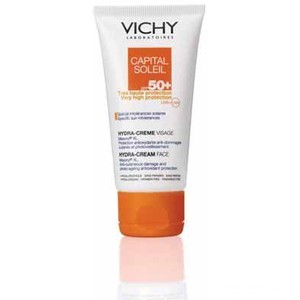 It’s interesting that such a wonderful expression should exist in French and not in English, or at least in Australian English where it would be very useful, given all the sun there compared to what we get in France (it’s a very rainy day today).
It’s interesting that such a wonderful expression should exist in French and not in English, or at least in Australian English where it would be very useful, given all the sun there compared to what we get in France (it’s a very rainy day today).
Your capital soleil is the amount of sun that your body can be exposed to during your lifetime without causing something disastrous like skin cancer. It’s used very widely in advertising for sunscreens in France. Vichy even has a brand called Capital Soleil.
When I’m translating for cosmetic brands, I usually have to rewrite the sentence completely:
Chaque individu dispose d’un capital soleil déterminé à la naissance becomes “Each person can only absorb so much ultraviolet radiation during their lifetime without developing cancer”, for example.
Close in meaning is capital santé which is sort of health and fitness combined. Surprisingly, there is no word for “fitness” in French so salle de fitness and centre de fitness are used.
Yet the French go on fitness kicks as much as anyone else. Maybe the idea could be expressed using forme. J’ai retrouvé la forme means that I got back in shape or got fit again and il a la forme means he’s very fit (well, in the physical sense anyway – it can also mean “he’s in great form”).
So back to capital. Here are some other examples of capital in French where we wouldn’t use “capital” in English (examples from the Robert-Collins dictionary which, if you’re going to use a bilingual dictionary, is probably the best because Harraps has become outdated and the others are pitiful):
le capital de connaissances acquises à l’école = the stock or fund of knowledge acquired at school
la connaissance d’une langue constitue un capital appréciable = knowing a language is a major asset
le capital artistique d’une région = the artistic wealth or resources of a region
elle a su bâtir un capital confiance = she managed to win everybody’s trust
Capital is used in the financial sense of course and we have all sorts of lovely expressions there as well, sometimes using “capital” and sometimes not:
capital circulant = working capital, circulating capital
capital décès = death benefit
capital d’exploitation = working capital
capitaux fébriles = hot money (I love that one!)
capital initial = start-up money
capitaux propres = equity capital (where propre = own and not clean! “Dirty money” is argent noir or sale)
capital social = share capital
Any more suggestions?





I don’t think I’ve encountered any of these uses of capital! Actually I must have seen a couple of them, but they clearly didn’t sink in. I must have either guessed their meaning or got help with the sort of form they would be on.
The French useof the word “fitness” has rather the meaning of the English “exercise”, I think. My son used it at my goddaughter’s first communion, in a Catholic church (we never go to church), after having to stand up, sit down, kneel, stand up, sit down and stand up again: “Ce n’est pas de la religion, c’est du fitness!” My British friend translated that to: “This isn’t religion, it’s exercise!” Re. “capital”: I have been known to tell my kids: “Mon capital patience est bientôt épuisé…”
Yes, a little stronger than our exercise, though, I would say. It’s always associated with equipment. I’ll like your “capital patience”!
Hi
I really like these Friday words sessions – it helps me to understand the French version instead of the Canadian version. I said Canadian since I am not a Québecois.
Since you ask this is a word worth exploring – “entitlement”
the online translations I found get close with – “droit” but does not get into nuances such as in
The community lost their vistas because of a new housing project; they were convinced that they were entitled to these vistas, so it created great stress for years to come.
Hi, glad you’re enjoying them and thanks for the suggestion. What other nuances would you consider are in “entitlement” that are not in “droit”? I would have naturally used “droit” in this context so maybe “droit” has more nuances than “right” …
When someone has had something (often enjoyed) for a long time they feel they are entitled to continue having it. When it is threatened to be taken away they claim they have the right to keep it. so exploring if entitlement and right only translates to “droit” and as in this post about capital, it has to used in a sentence to create the different meanings where in English there are 2 words.
I first came across this when a community had a vintage hospital which was going to be closed because they could not get Doctors to work there. the authorities wanted to consolidate services in a new facility 20 km away. They kept saying that they had the right to keep their hospital because they paid taxes so they should upgrade the older hospital at great expense to the tax payer – but complain when their taxes go up . A friend introduced the word entitlement rather then using “their right”.
Thanks Conrad, I’ll think about this and elaborate next Friday!
I enjoyed your discussiopn of ‘capital’ this week – and I loved the photos of BLOIS in your other Blog segment. Keep up the great work.